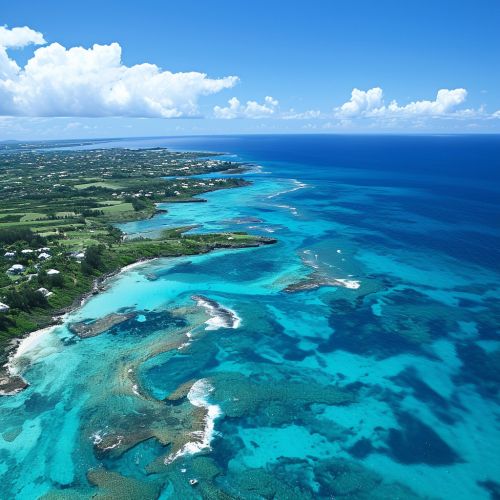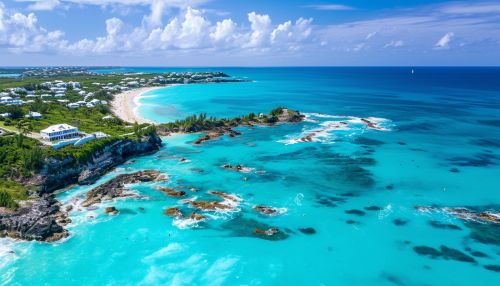Bermuda
Geography
Bermuda is a British Overseas Territory located in the North Atlantic Ocean. It is one of the last remnants of the once vast British colonial empire in North America. The archipelago is formed by approximately 138 islands, with the largest island being known as Main Island, often referred to as Bermuda itself. The islands are low-lying and are composed of limestone, the top of a volcanic seamount. The highest point in Bermuda is Town Hill in Smith's Parish, with an elevation of 79 meters (259 feet).


Climate
Bermuda has a subtropical climate, with warm, humid conditions prevailing year-round. The islands are in the hurricane belt and prone to severe weather; however, they receive some protection from a coral reef and their position at the north of the belt. The hurricane season in Bermuda runs from June to November, with the majority of storms occurring in October. Despite this, Bermuda's climate is significantly moderated by the warm waters of the Gulf Stream current.
History
Bermuda was discovered in the early 16th century, most likely by a Spanish explorer, Juan de Bermúdez, from whom the islands take their name. However, it was not until the early 17th century that the English established a permanent settlement there. Bermuda's history has been shaped by its strategic location and its isolation from the mainland. It has been a significant naval and military base, a hub for Atlantic shipping, and more recently, a center for offshore finance.
Economy
Bermuda has one of the highest per capita incomes in the world, largely as a result of its offshore financial services industry and tourism sector. The island is known for its low taxation and enjoys one of the highest consumption levels per capita globally. The economy is considered highly specialized and dependent on import trade. The balance of payments is heavily influenced by the earnings of the financial sector, which is dominated by insurance and other financial services.
Government and Politics
Bermuda is a British Overseas Territory, and as such, the United Kingdom is responsible for its defense and foreign affairs. However, Bermuda is self-governing in most internal matters, with its own constitution and government, which enacts local laws. The political system is a parliamentary representative democratic dependency, whereby the Premier is the head of government. The Queen is the head of state and is represented in Bermuda by a Governor.
Culture
Bermuda's culture is a blend of Native American, Spanish-Caribbean, English, Irish, and Scottish influences, reflecting the various sources of its population. The island is known for its unique Bermuda shorts, as well as for its music, dance, and art. Bermuda's cultural festivals such as the annual Gombey Festival showcase the island's unique cultural heritage.
Flora and Fauna
Bermuda's flora and fauna are rich and diverse, reflecting the island's subtropical climate and isolation. The island is home to a variety of endemic species, including the Bermuda cedar, Bermuda palmetto, and the Bermuda rock skink. The surrounding waters are home to a variety of marine life, including the humpback whale, which migrates through Bermudian waters each year.
